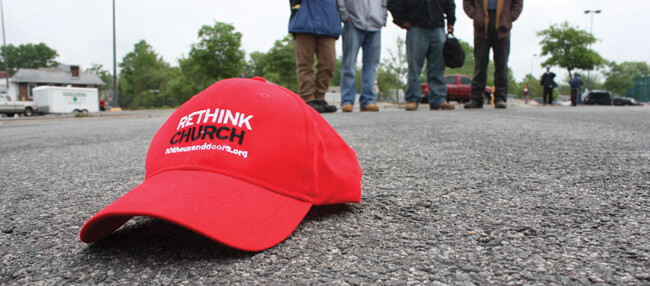
Bishops Rethink Church

In the early morning light, Jorge Ortiz points to the orange line of demarcation that day laborers at the Hope Depot on Rhode Island Avenue in Washington, D.C., are instructed not to cross.
Each morning between 70 and 100 Hispanic men gather in the parking lot hoping to be hired to do painting, drywall or other work. “Sometimes we can feel alone, desperate. Sometimes we are ashamed,” he said. “The men here just want to work. This can be hard.”
But on May 5, more than 30 United Methodist bishops from across the world dropped in on the men, to pray with them and to offer hope and breakfast.
Their visit marked the launch of Rethink Church, a four-year, $20 million advertising campaign to promote the denomination among young adults.
The campaign is an evolution of the “Open Heart, Open Mind, Open Doors” campaign. Its Web site (www.10thousanddoors.org) asks “What if church wasn’t a noun, but an active verb,” and “What if church wasn’t just a building, but thousands of doors?”
 The episcopal visit, said Bishop John Schol of the Baltimore-Washington Conference, was an answer to those questions.
The episcopal visit, said Bishop John Schol of the Baltimore-Washington Conference, was an answer to those questions.
“The church must move beyond its walls and into the community,” he said. “Jesus is here among these day laborers. We should be as well.”
The bishop led his fellow bishops, who were all clad in red jackets and caps with Rethink Church logos, and the more than 50 workers in prayer, in which he asserted every person’s right to work, right to have and care for his family and right to live with dignity and wholeness in community.
Jose Francisco Ruiz, one of the day laborers, stepped forward to thank the bishops for their visit and for the love they demonstrated. “Christ cares for the lowest,” he said. “It is in the plan of God that each of us care for one another.”
Bishop Hans Vaxby, of the Eurasia Area, paused from handing out food and juice to the men to celebrate the new ways people are thinking about church. “Often our church buildings can limit us. People think that’s what church is,” he said. “But church is really here, in this parking lot, in the sharing of this food, and among the people gathered here – even if it’s only for an hour.”
That expression of God’s love will continue, Bishop Schol said, through the ministry of Foundry UMC in Washington, which provides breakfast to the men at the Home Depot location and at 15th and P streets on alternating Thursdays.
Jana Myer, the church’s minister of mission, leads the outreach efforts.
 Ramon Zepeca, of the D.C. chapter of Jobs for Justice, helps coordinate and care for the day laborers who gather at the Home Depot in D.C.
Ramon Zepeca, of the D.C. chapter of Jobs for Justice, helps coordinate and care for the day laborers who gather at the Home Depot in D.C.
Zepeca shared with the bishops a bit about the lives of the men, most of whom are immigrants from Latin America. About 63 percent are under the age of 38, more than two-thirds have at least one child they are working to support.
Zepeca works in partnership with the Union de Trabajadores. One of the tasks he performs is helping the laborers when wage theft occurs. Because there are no formal work arrangements, about 60 percent of day laborers have experienced some form of wage theft, in some instances being deprived of thousands of dollars for work they performed, he said.
There are any number of ways those interested in day laborer ministries can become involved, Zepeca and Myer said. The pair holds informal English as a Second Language classes in the Home Depot parking lot. Financial contributions are also always welcome.
But the primary advice they offer is to get out of the church building and speak to people. Discover what their issues and passions are and how you can become involved.
In Gaithersburg, where 20 other bishops visited to meet with the day laborers, David Rocha, pastor of Camino de Vida, shared his story with the United Methodist News Service.
 Rocha, who fled persecution in Colombia 18 years ago, is being commissioned in June. He started a ministry feeding and praying for the day laborers who used to gather outside Grace UMC in Gaithersburg.
Rocha, who fled persecution in Colombia 18 years ago, is being commissioned in June. He started a ministry feeding and praying for the day laborers who used to gather outside Grace UMC in Gaithersburg.
He was there to greet the bishops, who took this time apart on the morning of May 5 from their week-long Council of Bishops meeting in Bethesda.
Rocha called the bishops’ visit a gift from God. “It represents a voice to people without voices to places were our voice needs to be recognized,” he said. “Groups of people who live on the border need voices in the places where decisions are made to create better conditions.”
Rocha encouraged his fellow United Methodists to rethink church. “Leave the four walls,” he said. “Go out. The church is alive. If we keep our pews full, the people in the streets will not find Jesus.”

Login/Register to leave comment